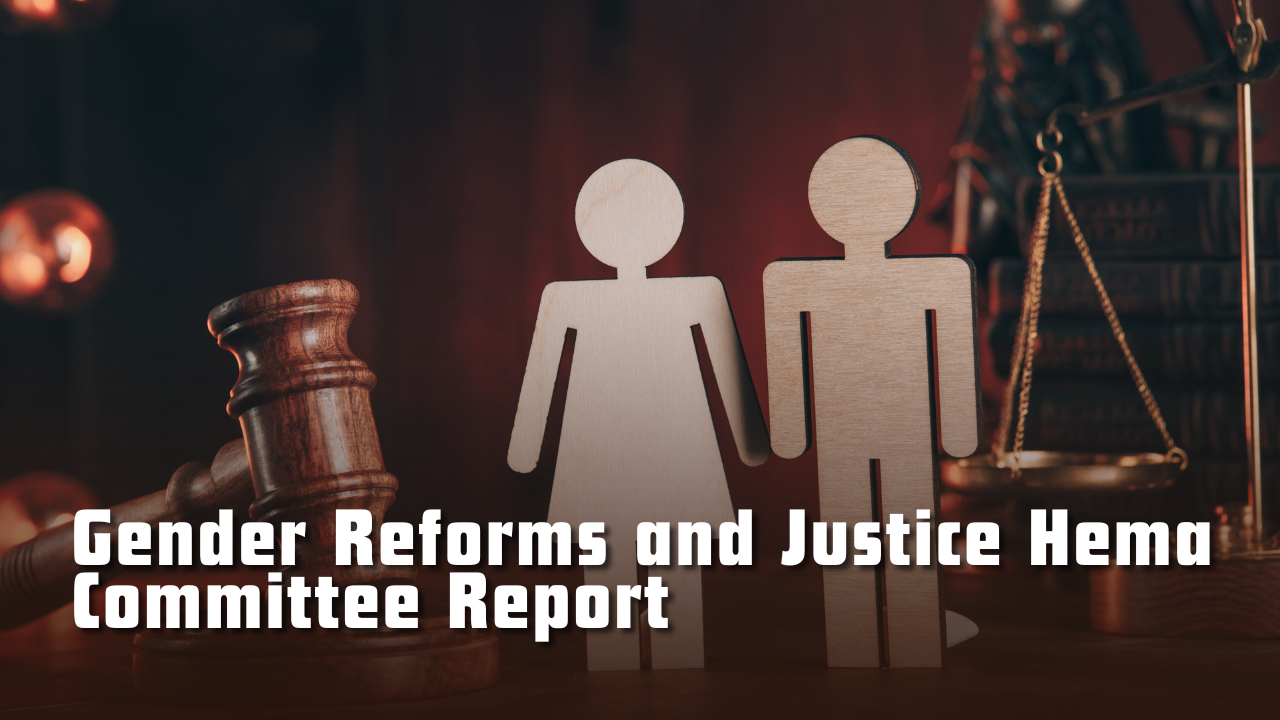Gender Reforms and Justice Hema Committee Report
Why police have dropped sexual assault cases
Context: In a significant development, the Kerala Police dropped 35 sexual assault cases on June 4, 2025, which had been filed in the wake of the explosive Justice Hema Committee report on gender discrimination and sexual harassment in the Malayalam film industry.
More on News
- The cases, taken up suo motu by the police, were withdrawn citing lack of evidence and non-cooperation from survivors.
- This comes nearly a year after the Kerala government released the Justice Hema Committee report on August 14, 2024—over four years after it was submitted.
What Is the Justice Hema Committee Report and Gender reforms?
- The Justice Hema Committee was constituted in July 2017, following a high-profile sexual assault case involving a prominent Malayalam film actress who was abducted and assaulted in a moving car on February 17, 2017.
- Popular actor Dileep was accused of masterminding the attack.
- The outrage that followed led to the formation of the Women in Cinema Collective (WCC)—a platform for women actors, technicians, and filmmakers.
- In May 2017, the WCC petitioned Chief Minister Pinarayi Vijayan, demanding an independent probe into gender-based violence and systemic discrimination in the film industry.
- Responding to the outcry, the state government appointed a three-member panel, comprising retired High Court Judge K Hema, former bureaucrat K B Valsalakumari, and actor T Sarada—making it the first state-level committee in India to investigate gender bias in the entertainment industry.
- The Committee submitted its findings in December 2019, but the report remained confidential for over four years.
Why Was the Report’s Release Delayed?
- The Kerala government initially withheld the report, stating it contained sensitive personal accounts that could compromise the privacy and anonymity of women who testified.
- However, five RTI activists and journalists moved the Kerala State Information Commission (KSIC), demanding public access.
- On July 6, 2024, the KSIC ruled in favor of a controlled disclosure of the report.
-
- On August 14, 2024, a redacted 63-page version was finally made public.
Key Findings of the Justice Hema Report
- The report painted a damning picture of the Malayalam cinema ecosystem, exposing:
- A widespread culture of sexual harassment
- Casting couch practices where women were coerced into sexual favors for roles
- Frequent vulgar comments and workplace misconduct
- Incidents of drunk male co-actors entering women’s rooms
- Reluctance among women to report harassment, fearing career repercussions
- Following the release, several women came forward publicly, naming well-known actors and technicians.
- The revelations put the spotlight on the Association of Malayalam Movie Artistes (AMMA) and its role in shielding alleged perpetrators.
Why Were the Sexual Assault Cases Dropped?
- At the height of the investigation, Kerala Police had filed nearly 60 cases, including those based on survivor testimonies and media reports. However, by mid-2025, 35 of these cases were dropped.
- According to officials:
- Many survivors did not want to pursue legal proceedings after sharing their stories
- A number of incidents were over a decade old, making evidence collection difficult
- Some survivors cited mistrust in the legal process and opted not to cooperate further
What Next for Gender Justice in Kerala’s Film Industry?
- Women working in Malayalam cinema say that dropping the cases is not the end—it’s a wake-up call.
- They have urged the Kerala government to initiate systemic reforms in the film sector, such as:
- Establishing Internal Complaints Committees (ICCs) within film associations
- Creating safe reporting mechanisms
- Enforcing codes of conduct across sets and production houses
The Justice Hema Committee report and the subsequent wave of disclosures have opened a critical dialogue on gender rights in the entertainment industry. While the withdrawal of 35 sexual assault cases may seem like a setback, it also underlines the urgency of institutional reforms and long-term protections for women.
Subscribe to our Youtube Channel for more Valuable Content – TheStudyias
Download the App to Subscribe to our Courses – Thestudyias
The Source’s Authority and Ownership of the Article is Claimed By THE STUDY IAS BY MANIKANT SINGH


